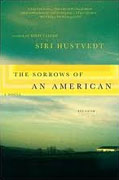The Sorrows of an American
Siri Hustvedt
book reviews:
· general fiction
· chick lit/romance
· sci-fi/fantasy
· graphic novels
· nonfiction
· audio books
· author interviews
· children's books @
curledupkids.com
· DVD reviews @
curledupdvd.com
newsletter
win books
buy online
links
home
for authors
& publishers
for reviewers

 |
The Sorrows of an American Siri Hustvedt Picador Paperback 320 pages March 2009 |
|
“I’m so lonely,” is a cry that the psychiatrist narrator of this truly engrossing novel admits to uttering at times, apparently addressed to himself and emanating spontaneously.
Then there is a newly-acquired burden: his yearning for Miranda, the beautiful, Jamaican-born single mother of a remarkable five-year-old daughter called Eggy, for whom he has become a fond father-substitute (her own father being an erratic-artist-turned-scary stalker). Mother and daughter live in the rental unit of his Brooklyn brownstone, so disturbingly close that his wound of unreturned love has scant chance to heal. In Eggy, Hustvedt may have set a new standard for a believable, fascinating child character. She is, in her precocity and creative means of expressing feelings, a pint-sized jewel. Within a plot with highly diverse elements, family history and current complex relationships loom large. Lars’s survivors come to realize that the hitherto skimpy Davidsen annals may need not only augmentation but revision following discoveries such as a diary of Lars’s searing World War II combat experiences. Some added lore comes from quizzing mostly ancient relatives in the Minnesota town where Erik and Inga grew up as descendants of Norwegian immigrants. A waspish crone in their gene pool grudgingly receives Lars’s survivors. She and her odd care-giver, it seems, have a bizarre mode of recording events: meticulously creating and selling by mail-order a line of funereal dolls memorializing misfortune. The visitors are shown a girl doll with leg cast and crutches who “fell down the stairs,” an old woman doll “on the day she died,” and a middle-aged male doll holding a miniscule letter reporting the war-time death of his son. Is it cold-hearted schadenfreude or simply a way to garner needed income from well-to-do doll collectors? In the contemporary New York segments (and within the family history motif) are Miranda’s anecdotes of her years in Jamaica, including the violent death of a beloved uncle which still haunts her. Here, also, the Davidsens interact with a fascinating, creatively conceived panoply of characters. One of these might have been crafted by the author while Dickens was looking over her shoulder and chuckling in approval. Bernard Burton had been a medical school colleague of Erik’s who “even then was a fat, waddling red-faced person... His chief trouble, however, wasn’t his looks but his moistness. Even in winter, Burton had a steamy appearance. Bubbles of perspiration protruded from his upper lip. His forehead gleamed, and his dark shirts were notable for the great damp circles under the arms. The poor fellow gave the impression he was humid to the core, a peripatetic swamp of a man with a single vital accoutrement – his handkerchief.” It requires a strong central character to over-arch such a labyrinthine plot with its many compelling characters, yet Erik more than meets the test. Physically imposing at 6-foot 5-inches (a legacy from those Norwegian forebears), he appears also to possess a reservoir of character strengths: compassion, an unwavering sense of responsibility for those who lean on him, and an acute awareness of his own vulnerabilities. The latter includes the drain on himself because of the family’s emotional dependence, his divorce that ended a bitter marriage, and his inability to reach a point where the lament “I’m so lonely” no longer applies. In this age of flawed fictional males – too often puerile and narcissistic partial-people - he towers both in worth and height. Yet he is no Atticus Finch. For one thing, saintliness would blunt his sex appeal, which so reveals itself throughout that this exasperated reader is moved to wonder why Miranda is so oblivious to the sizzle, considering that his psychiatrist colleague and sometime bed-mate Laura Capelli expressed this enthusiastic, if nearly sub-lingual, reaction to their first coupling: “Good god, Erik. good god!” Clearly, if amplified and spun off, certain yeasty subplots and characters in this novel have potential to encore in subsequent books. I would rush to read a sequel. Siri Hustedt has, I am certain, many other stories to tell, too. Bring them forth!
Originally published on Curled Up With A Good Book at www.curledup.com. © Norma J. Shattuck, 2008 |
|
|
|
 Click here to learn more about this month's sponsor! |
|
| fiction · sf/f · comic books · nonfiction · audio newsletter · free book contest · buy books online review index · links · · authors & publishers reviewers |
|
| site by ELBO Computing Resources, Inc. | |
 It possibly functions as Dr. Erik Davidsen’s safety valve, since he serves as the reliable, compassionate, wide-shouldered counselor/comforter to his mother Marit, sister Inga, and niece Sonia, whose unresolved grief at the death of family patriarch Lars roils them, piled upon previously existing angst. All the while, he must continue serving the disparate needs of his patients, some of whom are quite unpleasant.
It possibly functions as Dr. Erik Davidsen’s safety valve, since he serves as the reliable, compassionate, wide-shouldered counselor/comforter to his mother Marit, sister Inga, and niece Sonia, whose unresolved grief at the death of family patriarch Lars roils them, piled upon previously existing angst. All the while, he must continue serving the disparate needs of his patients, some of whom are quite unpleasant.